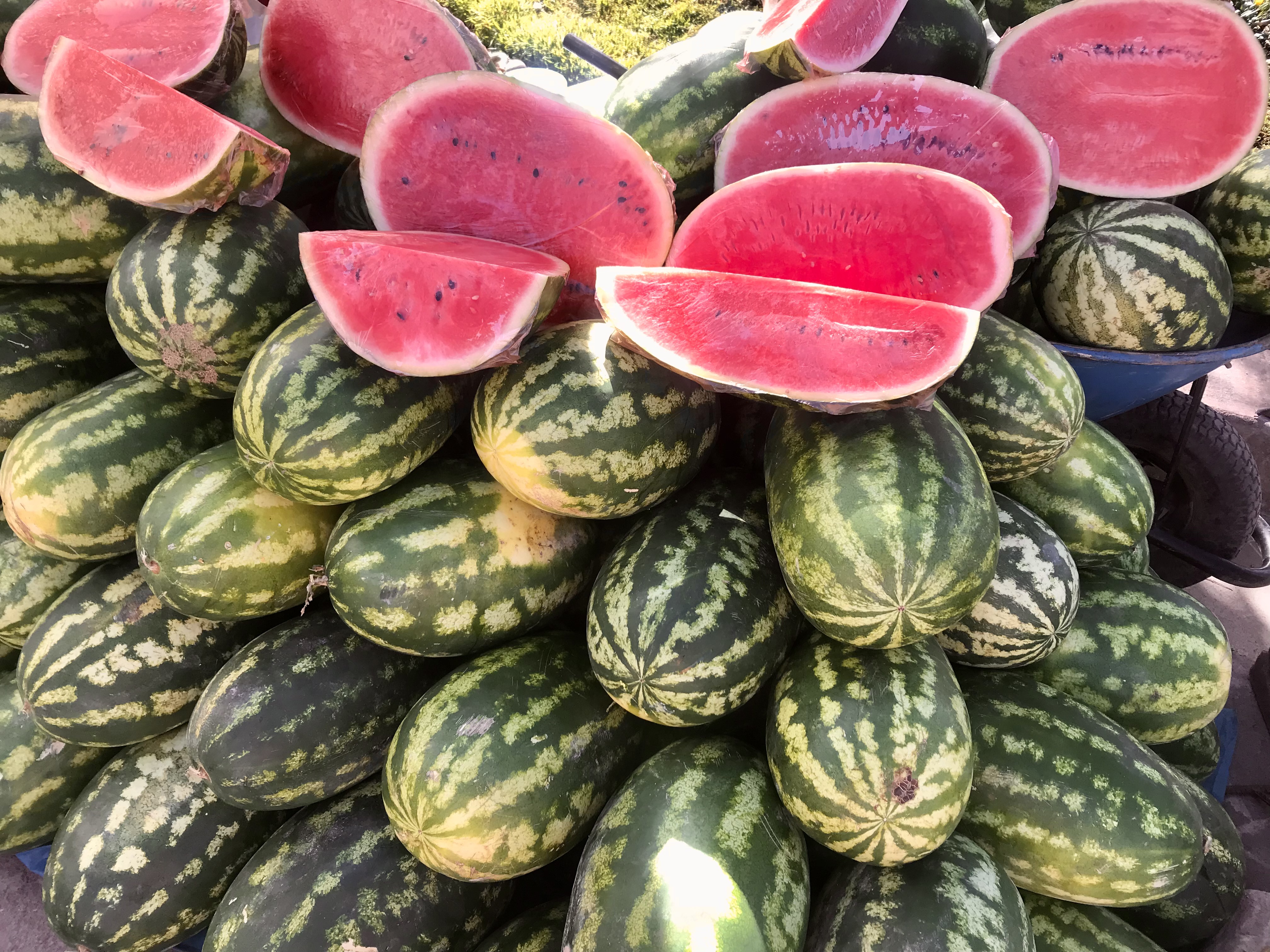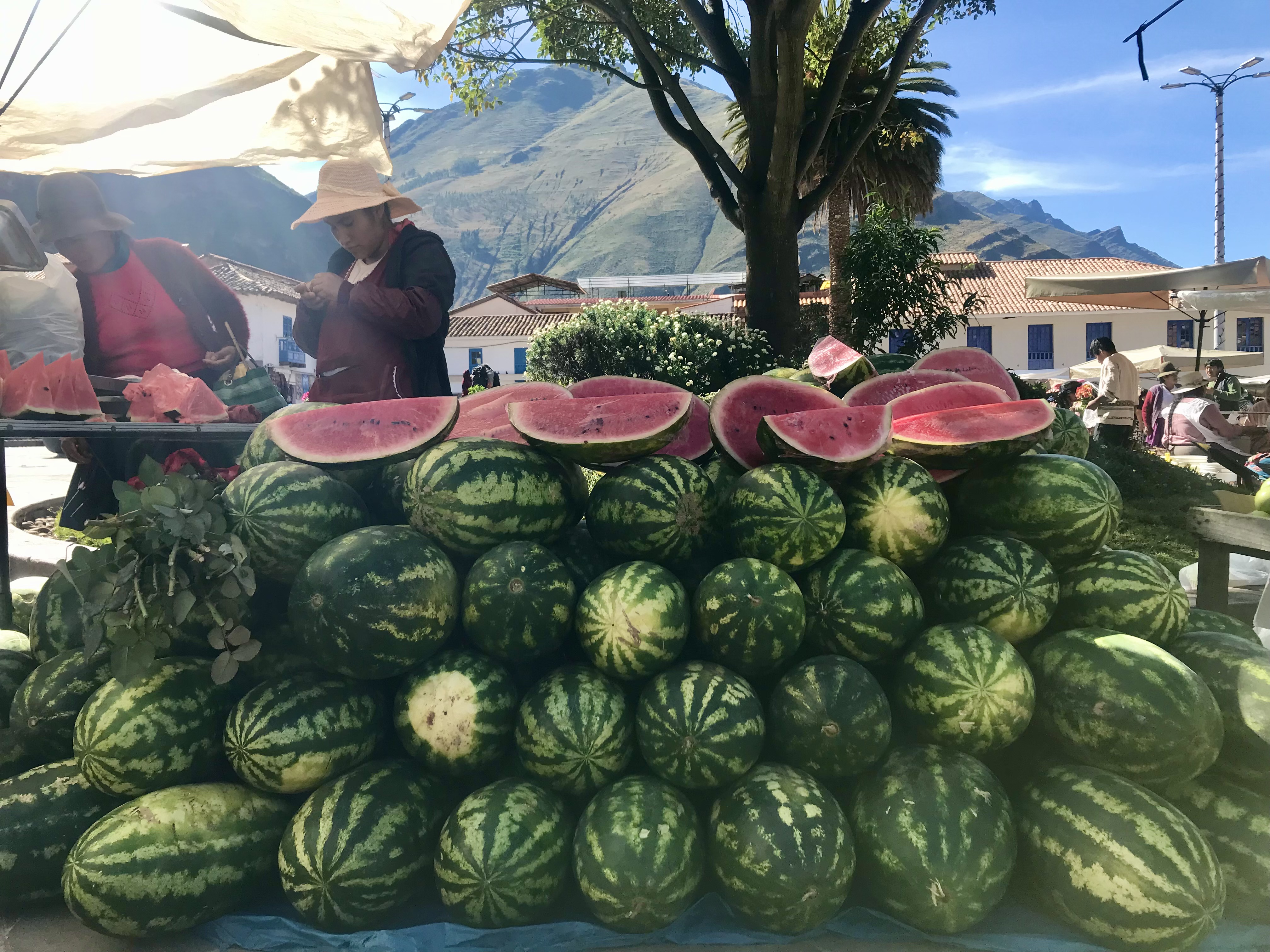
Summer is on its way, and melons are coming back in stores. That is, if you find yourself in the northern hemisphere of our planet. Over here in the Amazon rainforest, we are actually in winter, which is still crazy hot. And thus, watermelons are a welcome refreshing treat all year round!
However, watermelons do not only stand out for their great hydrating power. They are indeed about 92% water, but they also contain good amounts of nutrients and powerful antioxidants.
The watermelon's powers:
- Contains a good amount of potassium and hardly any sodium
- Has nice levels of beta-carotene, vitamin C, and B6
- It is the food that contains the greatest amount of the antioxidant lycopene
- Contains the amino acid citrulline
Let's have a look at what this can contribute to our health.
High potassium & low sodium support enzyme activity
The enzymes in our cells function at their best when inside the cell there is a low level of sodium and a high amount of potassium. This means that a huge portion of your processes will function better and faster. You will have more energy and, basically, just be healthier. So thank you, watermelon!
Decreasing high blood pressure
High sodium (salt) levels contribute to high blood pressure, which in turn increases the risk of cardiovascular problems and strokes. Next to this, it also puts a heavy burden on the kidneys, whose job it is to excrete excess sodium.
Reducing your salt intake and adding some watermelon to your diet this summer can really do you good!
Vitamin A for eye health and anti-infections
Watermelons are the food that contains the highest amount of lycopene. Lycopene is an antioxidant that gives watermelon its red-pinkish color. The body usually converts a part of this to beta-carotene, which in turn converts to vitamin A. Vitamin A helps us fight infections and is famous for supporting the health of our eyes.
But watermelons also contain beta-carotene. This fruit is therefore a powerful provider of vitamin A.
Lycopene helps lower the risk of cancer and diabetes
Antioxidants protect our cells from being damaged by free radicals. Minimising the amount of cell damage in our bodies reduces the chances of experiencing chronic diseases. Chronic illnesses are long-standing and deeply rooted health conditions, oftentimes caused by things gone wrong in the foundations of our being, like cell damage.
Watermelons have several different antioxidants, but lycopene really stands out in quantity. It has been found to be particularly protective for cancer and diabetes.
Vitamin C for your skin and immune system
Another antioxidant in our watermelon is vitamin C. Together with beta-carotene and a nice amount of B6, they support your collagen production, which is important for your skin, and not only for your skin. It is also needed for healthy bones, cartilage, tendons, ligaments, muscles, blood vessels, gastrointestinal tract and hair and nails.
Vitamin C is also known to strengthen the immune system, thus helping you fight disease. Sometimes bleeding gums can be relieved by making sure one gets enough vitamin C.
Vitamin C is crucial for us; without it, we die. Many animals can make their own vitamin C; however, humans, guinea pigs, and apes don't have this ability. Many fruits can provide us with this nutrient, and a slice of watermelon contains about 12 mg.

B6 against morning sickness and depression
This vitamin is linked to amino acid metabolism. It is needed to form neurotransmitters like dopamine and serotonin that help you feel good. A lack of B6 can therefore result in symptoms of depression.
Morning sickness when pregnant can also be relieved with a good dose of this vitamin. Though one slice of watermelon might not suffice, it will contribute to the overall level.
The seeds of the watermelon are edible and also contain B6, as well as some zinc, iron, folate, magnesium, and some fatty acids that help lower cholesterol.
Citrullin creates arginine, an essential amino acid
This itself is also an amino acid. Amino acids are the building blocks of proteins. This particular one is the precursor of arganine, which is an essential amino acid for us humans. We need to get arganine from our food because our body cannot make it by itself.
Nitric oxide for healthy functioning of the penis
Citrulline is involved in the body's creation of nitric oxide. This substance relaxes the muscles that are in the walls of our arteries, so they widen and let blood flow more freely. This then reduces blood pressure, but it also helps the penis become erect. Citrulline supplements are used to treat mild erectile dysfunction. Viagra is still found to be more effective, though. But, who knows, our watermelon could be the future natural medicine to help relieve difficulties with getting an erection.
Less muscle soreness after workout
It is thought that, because citrulline (nitric oxide) also increases blood flow in the muscles, it decreases muscle soreness after a workout. The extra flow of blood brings extra nutrients and clears out waste, and this could be a reason why this substance decreases workout pains.
Certain athletes take citrulline in supplement form, as some research indicates it benefits strength and muscle performance.
Add watermelon to your diet in a healthy way
It is clear that watermelon has some great health benefits. I can definitely advise you to add some to your diet this summer. But please don't go on a watermelon-only diet! Watermelon does not contain all off the nutrients we need, so only eating this (or any other food) is like starving yourself.
For some people, mixing watermelon with other fruits can result in bloating or other minor upsets. If that happens for you, then just eat watermelon on its own and eat other fruits at another time.
In future posts, we are going to dive deeper into all those nutrients that we need and why we need them.
Until next time, take care!
Medical Disclaimer
Sources
https://pubmed.ncbi.nlm.nih.gov/36771366/
https://pubmed.ncbi.nlm.nih.gov/33187365/
Food as Medicine, How to use diet, vitamins, juices, and hrbs for a healthier, happier, and longer life. By Dharma Singh Khalsa, M.D.
it's an awesome tip this post, and i want to tell that whe white part have much more vitamin thatn the red one, i always eat it! haha ty for this post!
Hey @magri21 ! Thanks for adding your tip as well! I also eat it, but I didn't know if was more nutrient dense!